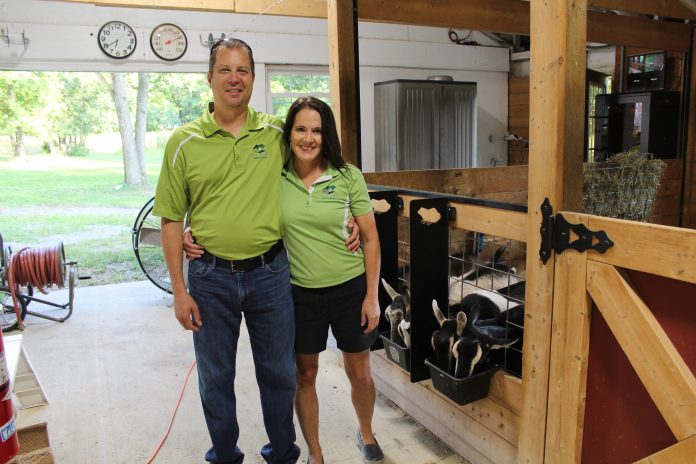
David and Marsha Coakley never thought they’d be goat farmers.
David Coakley bought his home at the back of a small subdivision in Canfield in 2011 because he wanted some land to keep his horse. They got another horse to keep the first company. Then they got a couple Alpine goats a few years later in 2015. They had the room for them, so why not?
“If you would’ve asked either of us 10 years ago if we’d be goat farmers, we would’ve laughed uncontrollably in your face,” Marsha said.
What started with two goats turned into 25 goats, a milking parlor and a creamery, where the couple plans to make soft cheeses and bottle milk. The Coakley’s Frog Pond Farm and Dairy recently became the fourth Grade A goat dairy in the state.
Accidental beginnings
It all started in 2016 with a precocious udder. One of their goats suddenly started making milk without being bred. It wasn’t clearing up on its own. Marsha wanted to give the goat some relief, so she hand milked into a stainless steel bucket.
That was the first time she’d ever milked a goat. They didn’t have a milking stand. The whole process wasn’t the most sanitary, she admits. There was goat hair and other debris in the milk.
But she didn’t want to waste the milk, so Marsha figured she’d try her hand at making goat’s milk soap.
“A friend and a couple grandkids came over. We went into the driveway with the lye and oils and everything,” she said. “We had on our safety glasses. We figured it would explode.”

Nothing exploded, but “it was a pretty bad batch of soap,” Marsha said. She tried again and the second batch was better. She gave it to some people at work. When they came back and asked if she had anymore, she thought they might be onto something.
Marsha kept making and selling soap as a hobby for about a year when they got their first big break. Hallmark was looking for local producers to stock a section of the store. Frog Pond Farm soap went into a handful of stores throughout northeastern Ohio. That helped build their brand and name recognition.
Next came goat milk fudge. Again, it took a while for Marsha to find the perfect recipe. She now makes 20 different flavors of fudge.
They figured it would be a seasonal thing, that people would only want to buy it around the holidays.
Then country music star Brantley Gilbert ordered 12 pounds of their fudge before his February concert in Youngstown. Gilbert was buying food from local veteran farmers to support the Farmer Veteran Coalition at his concerts. David is an Air Force veteran and a part of the coalition.
Frog Pond Farm’s fudge got rave reviews from the singer. A TV news piece on the farm and the singer was an unexpected shot in the arm for the farm, Marsha said.
“We were supposed to go on vacation the day after it aired, and we had people showing up in our driveway to buy fudge,” she said.
Getting bigger
As their product line evolved, so did their plans for the farm. They got better equipment for milking. They built up the barn that was just a shell when they bought the place.
They looked into selling their milk to another goat milk creamery. That plan didn’t work out, but it sent them down the path of looking into processing their milk into cheeses and other fresh dairy products on-farm.
“We looked at it like, why should we sell our milk under contract and make almost nothing when we could sell it ourselves and make more?” David said.
They started looking for equipment, most of which they got used from other farms or processors. They drove seven hours to Michigan to get a bulk tank. Their pasteurizer came from an ice cream shop in Cleveland. The milking stand came from another goat dairy in Ravenna.
What was an 11-foot by 15-foot screened-in porch at the back of their house was transformed into a modern cheese plant. It might be one of the smallest creameries in the state.
After a couple years of work, the dairy and cheese plant passed the state’s Grade A inspections in July. Now they’re ready for their next venture: cheese and milk.
They’re making five varieties of chèvre, a soft cheese. The cheese will soon be available for purchase through their website or through some retailers. They also hope to bottle and sell goat milk.
To keep up with the expansion on the farm, Marsha quit her job. She’s now on the farm full time. Again, this is something she probably would’ve laughed at had you told her years ago that she would quit her job to run a goat dairy.
Right now they’re milking about seven goats. All the goats will be dry for about three months before kidding starts in January, David said. This will be their biggest kidding season ever. Afterward, they hope to be milking 20 goats to keep up with all their products.
The goal is to grow with the demand, and see where the market takes them. They don’t want to force anything, David said.
“Opportunities have presented themselves, and we’ve taken them as they’ve come,” David said.
Find more information on Frog Pond Farm and Dairy at frogpondfarm.us.
(Reporter Rachel Wagoner can be contacted at 800-837-3419 or rachel@farmanddairy.com.)














